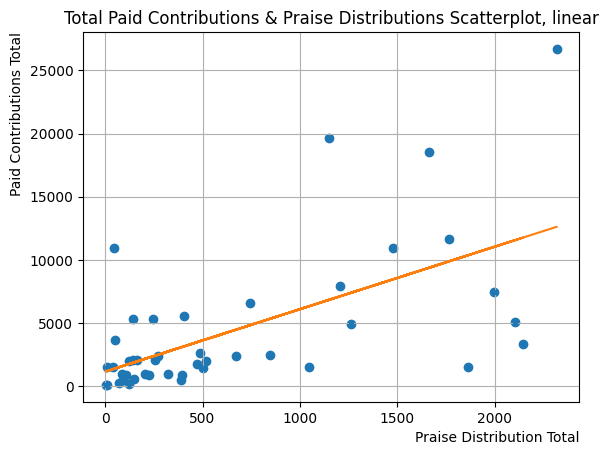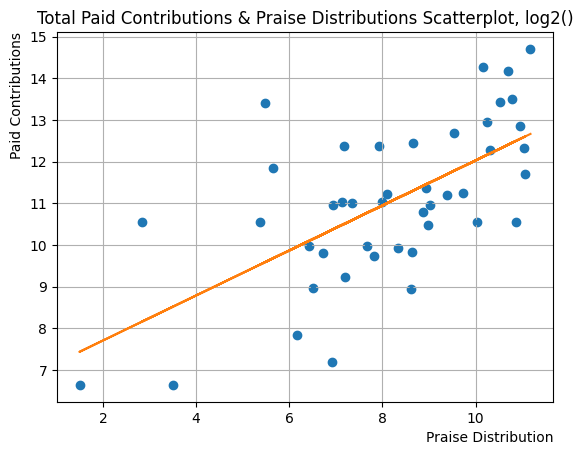Notes:
-
I initially created the report on the first week of October, and it has been a topic of discussion throughout the Rewards WG during the last month. Unfortunately, due to increased scope and , I have postponed its release. Nevertheless, I believe it necessary to publish my thoughts preceding the alternative Rewards Distribution Models discussions take place in the Forums.
-
Reposted to fix image hyperlinks and bring the Context and conclusions up to speed.
Context
I publish this report following the ardent discussion within our forum post regarding Reducing Rewards for Regular Paid Contributors [1]. Do take a read if you have been out of the loop.
Further, and provided $TEC remains a monetary asset, our community is yet to come to any agreement on:
- whether Praise, as an alternative value system, is and/or should value wider contributions in the community to those already paid by WG in $XWDAI (known as Praise Contributions and Paid Contributions henceforth)
- what the impact of the ”status quo” have been on $TEC governance; and
- what an alternative proposal which favours a ‘fairer’ Rewards distributions could look like.
Since then, I have pulled together an initial report on the performance of Praise as a redistributive force in the TEC. This report aims to cover a), with further posts in the following week to cover b). I am glad to see others are already contributing to c);
I hope that it contributes to the community discussion on the outcomes Praise has created, and helps to make better and more informed decisions on Praise.
Given the findings in this report, I believe there may also be value in instead understanding Praise as a health indicator by comparing the Praise : $WXDAI quotient amongst individuals and working groups in the TEC to measure where value generation is being concentrated. I have already found some interesting insights, but given I have also spotted a number of anomalies, I believe this, too, to be out of scope.
Sources
- https://forum.tecommons.org/t/reduce-rewards-for-regular-paid-contributors/1062/2
- https://github.com/m-r-g-t/tec-data-analysis/tree/main/reward_vs_payouts
- Reward Systems: The Heart of DAOs - Livia Deschermayer
- https://forum.makerdao.com/t/sourcecred-report/13277
- https://dune.com/rxx_/TRUST
- Token Engineering Commons Dashboard](Token Engineering Commons Dashboard)
Background
Introduction
Enhanced participation and discussion within communities with a strong collaborative component is of utmost necessity in regen spaces. If we seek to change the world and better the way things are done, it is logical to look for innovative methods that help us improve community outcomes. Highlighting and rewarding those accomplishments which add value, and fostering a positive environment in a nascent and dynamic commons as ourselves, is a great target to strive for.
Within that framework, the TEC community saw the potential of Praise and gradually incorporated it as a tool to reward contributions made to the Commons over the last year and a half.
The Protocol
Within Praise, it is the members of our community who themselves tag, highlight and describe others’ valuable contributions within our #praise channel.
Every contribution raised within a given period (lately of a month) is amalgamated into a Praise Round, wherein a select number of value-aligned Quantifiers assign a value to each contribution.
Once quantified, a specified $TEC amount is distributed each round in proportion to the contributions of each to the Commons.
Given these parameters, Praise should act as a reputation protocol for engendering open collaboration to measure and reward value creation in our community.
Execution
Praise commenced in June-July 2021, and as participation in the project has grown, so has its importance within our Commons. Following eighteen successful rounds and twelve months of quantification, it is highly unlikely that valuable work will be overlooked thanks to Praise.
The inclusion of Reward Systems across DAOs is usually to make up for granular non-paid contributions for sporadic contributors as well as a way to continuously distribute governance power to those who are putting in the work; but Praise being a system that is able to capture subjective contributions in a fairer way. So far, Praise has either distributed or is set to distribute 51791.25 TEC [2], in accordance with “Final Praise Allocation” data.
Nonetheless, $TEC serves a dual-purpose of both governance and monetary value, so Praise is aiding both goals in the commons - a reward system to give meaningful financial subsidy to people’s contributions, and a system to distribute governance power.
Praise does redistributive governance rights away from the hatchers and into the wider community, which have begun taking a more active role in Conviction Voting. Further, Praise provides a pinpoint for mutual appreciation, and a recollection on what valuable contributions are happening in the Commons within its channel.
Additionally, Praise has been viewed positively by adjacent DAOs; for Praise is now growing into many communities throughout the Gnosis Chain and beyond.
Part One: Praise as a Financial Tool
Despite its many positives, the main promise of Praise was to engross ampler value streams [3] in the Commons not already aligned with the monetary outflows by Working Groups. However, we have not yet analysed whether this has been the case at the TEC.
Comparative Analysis between Praise and Paid Contributions
Method
In order to analyse whether Praise has been successful as an alternative value system, and is considering wider contributions to the community, I have considered two datasets:
- “Final Praise Allocation” exports in TEC’s Rewards repo: https://github.com/CommonsBuild/tec-rewards
- A Dune Analytics query I made, on the basis of a @jh query, providing all outward Working Group (Paid) transactions: https://dune.com/queries/1256836.
I have built a simple Jupiter notebook to extract and collate all Praise allocations and Working Group stables outgoings. I am pulling the Dune data live from their GraphQL endpoints, so the analysis may be revisited in future. This is under my TEC repo at https://github.com/m-r-g-t/tec-data-analysis/tree/main/reward_vs_payouts
From this data, I will be able to evaluate two cohorts separately:
- Those who are earning both $WXDAI and $TEC, known as Paid Contributors.
- Those who have only earned Praise - Praise Contributors. (WIP)
Paid Contributors
In order to settle whether there exists a correlation between Praised and Paid contributions, I began by taking a snapshot for both payments from the first transaction until Round 17. Looking at the complete history for each individual of both types of contribution, we can set out to test whether there is a relationship with both linear and logarithmic scatterplots and Pearson Correlations.
Linear plot:

Pearson’s Correlation Coefficient: 0.61.
I notice a large skew on the data, which did not surprise me for social systems.
I noticed a large skew on the data, so I also represented the data under a logatithmic plot as below:
Logarithmic plot, base 2:

Pearson’s Correlation Coefficient: 0.64
Preliminary Thoughts:
It is evident from the data that there is a strong and positive, though certainly not perfect, correlation in the data between both the Praise and monetary value systems in the TEC. The data does not back those who theorised Praise as a radical, alternative shift in results from a purely monetary sense - those who earn much Praise are already being financed by the commons.
I have created preliminary analysis on the distribution of Praise between unpaid and paid work. As it is pending a review from knowledgeable members in the Commons, I am not yet prepared to release such visualisations.
Despite that, if we believe our peers in the Commons to be value-aligned with creating regenerative and extra-monetary economies, and the spirit of being anti-extractive, the plentiful payment already received by the highest earners should indeed be considered as part of remuneration for going beyond their way. Further, it would be a better mechanic for WGs to make a part-payment in TEC, rather than Praise bear such brunt on its already wobbly finances.
Given there is much work double-counted in Praise, and if public goods are what we claim to represent, then nurturing an atmosphere where uncaught positive externalities are captured on an individual level is paramount. Self-interest of those already valued for their work should not be the core decision-maker on the margin, lest we settle on an antithetical position to our own ethos.
Last, in view of the trading activity of many of the largest Praise receivers, it is unwise to disregard the monetary aspect of Praise in the Commons, as we have tried doing thus far. Evidently, Praise has in part acted as a bonus to the already plentiful.
Part Two: Praise in Governance
Despite that, the Rewards Group also behaves as a redistributive force throughout the Commons. The significant negative skew in the data is meaningful - it demonstrates Praise actively takes a much wider sample of ‘value’ in the Commons, especially in onboarding smaller contributions which would otherwise go unnoticed. Praise has certainly widened the pool of stakeholders throughout the TEC.
Part Two analysis to expand on this shall follow promptly.